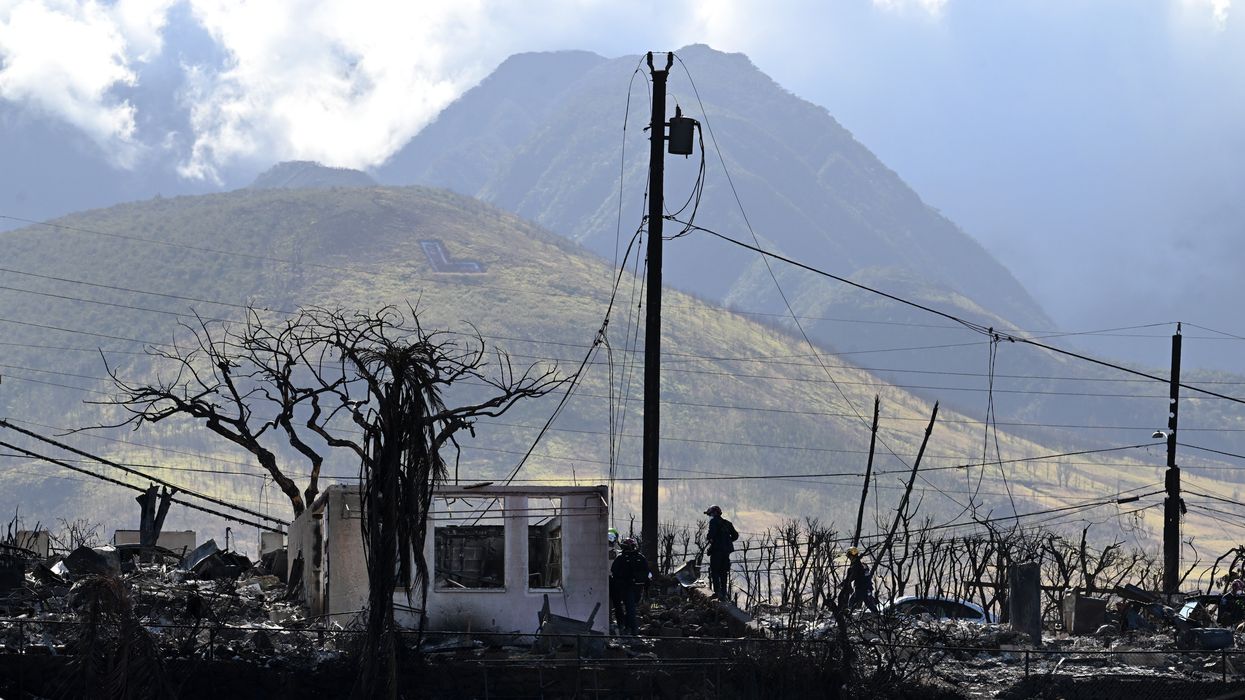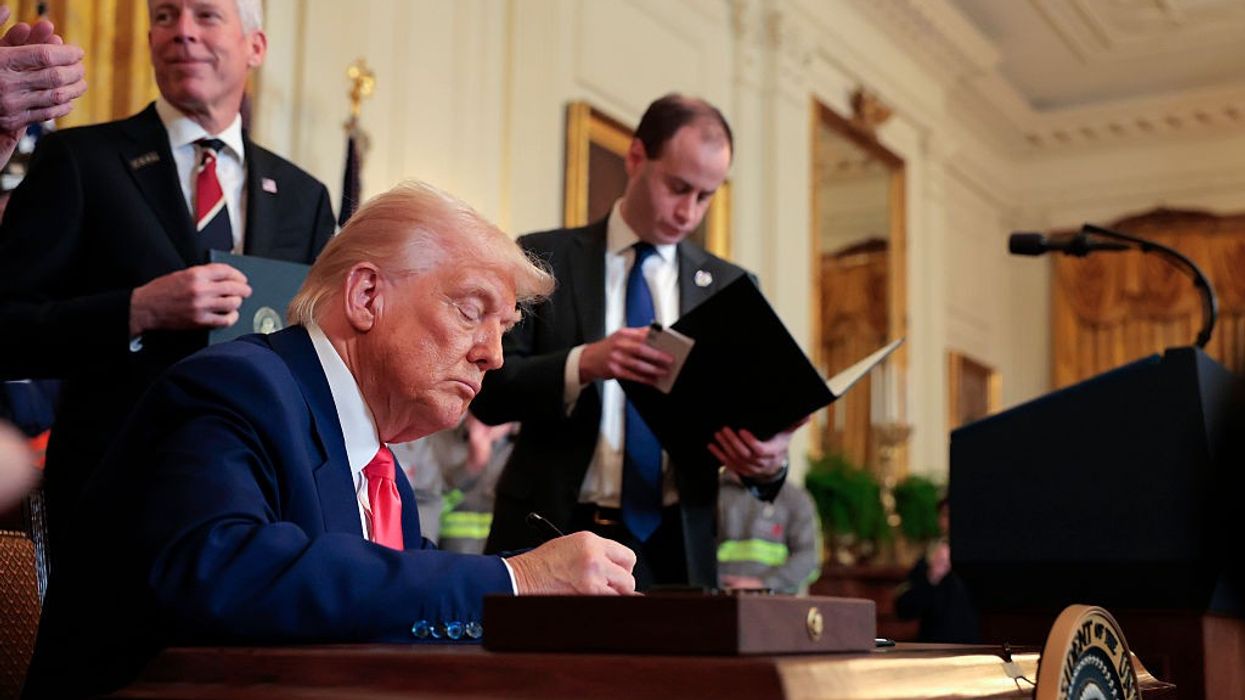Trump Is Trying to Spook States out of Suing Big Oil—Why They Shouldn’t Back Down
Given the shakiness of the administration’s lawsuits, what really matters is whether state and local officials have the courage to stand strong against Trump’s mafia-style threats.
As U.S. President Donald Trump continues to threaten any institutions that could check his administration’s ongoing drive toward authoritarianism, there’s been a stark contrast in responses to his mob boss-style attacks. Some targets—like Harvard, which vowed to fight Trump’s assault on universities, or the law firm Perkins Coie, which recently scored a judicial win holding Trump’s actions against the firm unconstitutional—have seen their stature in their respective fields skyrocket,. Others—like Columbia University or the law firm Paul Weiss, which both immediately folded at the first sign of aggression from Trump—have been publicly, and perhaps permanently, tarred as feckless cowards.
This contrast between courage and gutlessness appeared once again earlier this month in response to Trump’s latest dictatorial salvo: an all-out assault on behalf of the fossil fuel industry against state and local efforts to hold Big Oil companies accountable for deceiving the public about climate change.
Right now, 1 in 4 Americans live in a jurisdiction that is fighting to put Big Oil companies on trial for their climate lies and make them pay for the catastrophic damage they knew decades ago that their products would cause. The fossil fuel industry concedes that it faces “massive monetary liability” in these cases, and has been growing more and more desperate to stop plaintiff communities from having their day in court. In the last few years Big Oil has asked the Supreme Court to block these cases on five separate occasions. Recently, industry front groups tied to Leonard Leo ran a pressure campaign pushing the court to take up the issue.
Making polluters pay for climate damages is widely supported—and far more popular than Trump ever has been.
But the court has denied Big Oil every time, and so fossil fuel companies have had to shift to Plan B: asking the man they spent hundreds of millions of dollars electing to fulfill his end of the quid pro quo. The Wall Street Journal reported that oil executives asked Trump during a White House meeting for legal help against the cases, and their lobbyists are pushing congressional Republicans to include legal protections for the fossil fuel industry “in a coming Trump-endorsed bill.”
In his typical oligarchical style, Trump has gone all in to protect his corporate backers. On April 8 Trump issued an executive order directing the attorney general to “take all appropriate action” to stop states that have “sued energy companies for supposed ‘climate change’ harm.” And this month the Department of Justice filed a series of lawsuits attempting to prevent Hawaii and Michigan from pursuing climate litigation.
We’ve become so inured to the extreme misconduct of this administration that it’s often hard for any new scandal to stand out. But it’s worth taking a moment to appreciate the staggering corruption of this new broadside on the rule of law.
Trump is taking unprecedented action on behalf of an industry that understood decades ago that their fossil fuel products would cause, in their own words, “great irreversible harm,” “more violent weather—more storms, more droughts, more deluges,” and “suffering and death due to thermal extremes.” Instead of warning consumers about this existential threat, they waged a massive disinformation campaign to prevent the public from understanding the dangers of climate change. They made trillions of dollars from this deception, leaving regular Americans to pay the price.
And regular Americans certainly have been paying that price. They’ve been paying in higher insurance costs driven by the “violent weather” that Big Oil companies knew their products would cause. They’ve been paying in homes, businesses, and livelihoods lost in climate-driven “deluges.” And in far too many cases they’ve been paying with their own “suffering and death.” That is why many of the communities hit hardest by these disasters have sued—under the same long-established state laws used to hold Big Tobacco and opioid profiteers accountable—to force the companies responsible for global warming to contribute at least something to the often devastating climate costs that right now are falling entirely on the shoulders of regular Americans.
Trump, of course, doesn’t care about regular Americans experiencing, in his words, “supposed ‘climate change’ harm.” His concern is limited entirely to his Big Oil donors, who are terrified of having to defend their climate lies to a jury composed of the people they screwed over.
Unfortunately for Big Oil, we live in a federalist system of government that does not allow a president to unilaterally block a state from pursuing valid state-law claims in state courts. Indeed, legal experts seem to agree the suits filed by the administration against Hawaii and Michigan are “shockingly flimsy.”
That doesn’t mean Trump’s legal maneuvering isn’t a potent weapon, however. As we’ve seen with Trump’s assault on universities and law firms, the goal of these attacks is not winning in the courtroom. It’s all about intimidation—which means that what really matters is whether state and local officials have the courage to stand strong against Trump’s mafia-style threats.
Some leaders are demonstrating that they have that backbone. On May 1, Hawaii ignored the DOJ’s specious lawsuit and became the 10th state to sue Big Oil. As Hawaii Attorney General Anne Lopez said, “The state of Hawaiʻi will not be deterred from moving forward with our climate deception lawsuit. My department will vigorously oppose this gross federal overreach.”
Michigan Attorney General Dana Nessel had a similar response: “Donald Trump has made clear he will answer any and every beck and call from his Big Oil campaign donors… I remain undeterred in my intention to file this lawsuit the president and his Big Oil donors so fear.”
Sadly, not all local leaders have demonstrated such courage. Shortly after the DOJ announced its suits against Hawaii and Michigan, Puerto Rico voluntarily dropped its 2024 case that sought to make fossil fuel companies pay to help protect the commonwealth’s infrastructure against stronger storms, sea-level rise, and other damages fueled by climate change. The Leonard Leo-linked Alliance for Consumers, which days earlier called on Puerto Rico’s governor to help kill the case, crowed that the dismissal would allow consumers to “take comfort in knowing the things you buy for your family will still be there, at the store, when you need them”—an Orwellian message for the millions of Puerto Ricans who were unable to access basic goods for months following the climate-driven catastrophe of Hurricane Maria.
A spokesperson said the commonwealth dropped its case, which was brought under a previous administration, because Gov. Jenniffer González-Colón wanted to “be aligned with the policies of President Trump,” which is “to support the burning of fossil fuels [and] the protection of oil companies.” As a result, her constituents will be condemned to a future of escalating climate disasters that they—and not the polluters most responsible—will have to pay for.
But maybe the contrast between Puerto Rico’s humiliating supplication and Hawaii and Michigan’s courageous stands can help inspire other local and state jurisdictions to refuse to bend to Trump’s future threats. After all, making polluters pay for climate damages is widely supported—and far more popular than Trump ever has been.
When the history books are written about this lawless moment, the collaborators—the Columbias, the Paul Weisses, the González-Colóns—will not like how posterity remembers their cowardice. But leaders who rise to the occasion, who refuse to surrender to Trump’s protection racket, and who continue fighting to make polluters pay will be able to take pride in their place on the right side of history.


